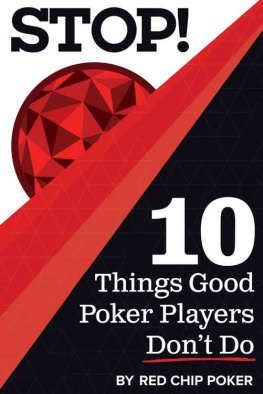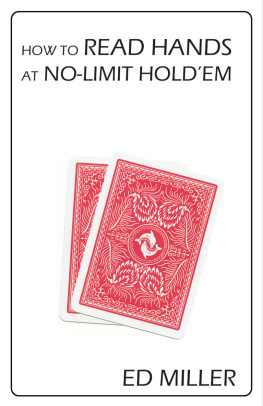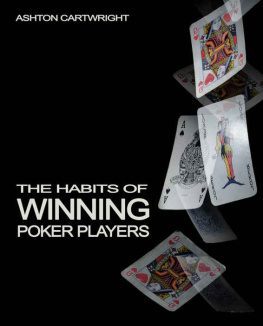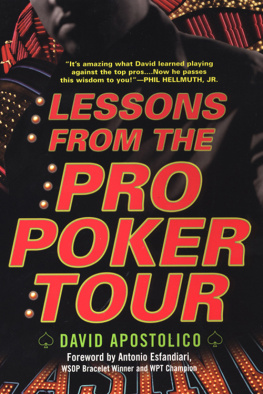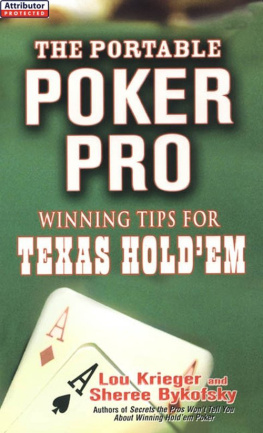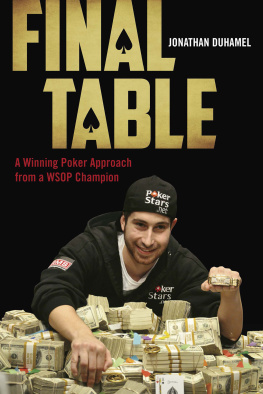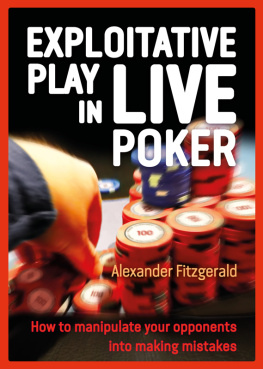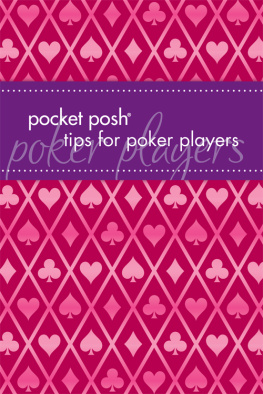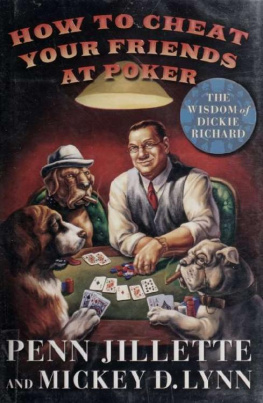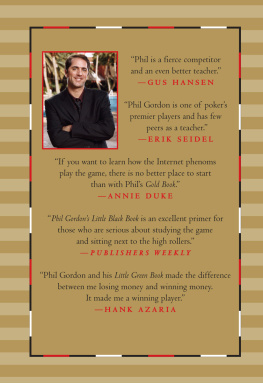Ed Miller - STOP! 10 Things Good Poker Players Dont Do
Here you can read online Ed Miller - STOP! 10 Things Good Poker Players Dont Do full text of the book (entire story) in english for free. Download pdf and epub, get meaning, cover and reviews about this ebook. year: 2015, genre: Home and family. Description of the work, (preface) as well as reviews are available. Best literature library LitArk.com created for fans of good reading and offers a wide selection of genres:
Romance novel
Science fiction
Adventure
Detective
Science
History
Home and family
Prose
Art
Politics
Computer
Non-fiction
Religion
Business
Children
Humor
Choose a favorite category and find really read worthwhile books. Enjoy immersion in the world of imagination, feel the emotions of the characters or learn something new for yourself, make an fascinating discovery.
- Book:STOP! 10 Things Good Poker Players Dont Do
- Author:
- Genre:
- Year:2015
- Rating:4 / 5
- Favourites:Add to favourites
- Your mark:
- 80
- 1
- 2
- 3
- 4
- 5
STOP! 10 Things Good Poker Players Dont Do: summary, description and annotation
We offer to read an annotation, description, summary or preface (depends on what the author of the book "STOP! 10 Things Good Poker Players Dont Do" wrote himself). If you haven't found the necessary information about the book — write in the comments, we will try to find it.
Ed Miller: author's other books
Who wrote STOP! 10 Things Good Poker Players Dont Do? Find out the surname, the name of the author of the book and a list of all author's works by series.
STOP! 10 Things Good Poker Players Dont Do — read online for free the complete book (whole text) full work
Below is the text of the book, divided by pages. System saving the place of the last page read, allows you to conveniently read the book "STOP! 10 Things Good Poker Players Dont Do" online for free, without having to search again every time where you left off. Put a bookmark, and you can go to the page where you finished reading at any time.
Font size:
Interval:
Bookmark:

Copyright 2015 by Miller, Sweeney, Hull and Soto
All rights reserved. This book or any portion thereof
may not be reproduced or used in any manner whatsoever
without the express written permission of the publisher
except for the use of brief quotations in a book review.
Limit of Liability and Disclaimer of Warranty: The publisher has used its best efforts in preparing this book, and the information provided herein is provided as is. The publisher makes no representation or warranties with respect to the accuracy or completeness of the contents of this book and specifically disclaims any implied warranties of merchantability or fitness for any particular purpose and shall in no event be liable for any loss of profit or any other commercial damage, including but not limited to special, incidental, consequential, or other damages.
First Printing, 2015RedChipPoker.com
All rights reserved.
ISBN-13: 9781517716905
A small leak will sink a great ship.
-Benjamin Franklin (The guy on $100 bills)
Every time you buy into the poker table and hand over some Benjamins for some red chips imagine Uncle Benny giving you that parting advice. If you listen, when you come back in a few hours you should be getting Uncle Benny, some of his twins and a few dead presidents back.
When you cash out, the chips you win are not different than the chips you fail to lose. Many players know how to win in good situations, but they dont know how to not lose in bad situations.
All of us at Red Chip Poker have coached players that have leaks in their game. Those leaks can cost $30 or more an hour. Handicapping yourself with costly errors will turn any winning player into a losing one. Plugging those leaks can turn losing players into winning players.
This book is about ten things that poker players should stop doing. It is not just a Fold pre-flop book. We cover hand selection, bad bet sizing and the tilt monster.
This is a simple book. There is a lot more depthin our other material. Find it at:RedChipPoker.com
Tilt is anything that takes you off your A-game it could be a situation, a thought, an emotional reaction or a myriad of other things.
Dr. Tricia Cardner
Weve all experienced tilt in one form or another. Humans are emotional by nature and those emotions flare up regularly on the table. Maybe somebody on the table is bullying you and you have an emotional response to that. Maybe somebody just sucked out on you. Maybe you just won $500 in an hour and you have an emotional response to that. These are common actions and reactions on any poker table.
But tilt is something we want to avoid at all costs. In an ideal world we would be ice-cold robots when we are playing poker. All decisions being calculated, optimized, and without emotion. Alas,we are not robots, and thus we have to understand tilt at a deeper level to ensure it doesnt creep up in our game and result in us losing extra money.
First, lets explore the three most common forms of tilt:L OSING T ILT
This is the most common form of tilt. A player loses a big pot after getting sucked out, angrily rebuys, and then loses another stack within a few minutes playing recklessly. Chances are youve done this as well (I know I sure have). Its extremely important that we are able to identify when someone is experiencing this form of tilt so we can put ourselves in a position to capture the money they want to throw away. And its also important that we eliminate this kind of tilt from our own game.
W INNER S T ILTThe opposite of Losing Tilt is Winners Tilt. This is when a player is winning and then immediately changes their game. One form of Winners Tilt is leaving a good game early in an effort to lock-up a win due to the fear of giving any of their winnings back. Another formis playing much looser since who cares? Im already up so much money anyway! Both are suboptimal reactions and take us out of our A-game.
B OREDOM T ILTHave you ever seen the player who has done nothing but fold for two hours and then randomly,out of the blue, he decides to make some absurd play? Their absurd play is almost always a reaction to Boredom Tilt. Most of us have fallen prey to this at one time or another; either playing a bad hand just because we are bored to want tosee a flop or refusing to fold a second-best hand post-flop because its been forever since weve gotten a good starting hand.
All forms of tilt take us away from our A-game and degrade our edge on the table. And the severity of tilt can range from losing a couple extra dollars in a hand to losing multiple stacksin an orbit. For what its worth, if you tilt and spew $200 for no reason, its going to take you a long time to recoup that loss. Even if you are crushing the game for $20/hr, it will take you 10 hours at an expected win rate to get that back.And if you are only winning at $8/hr, it will takeyou 25 hours at an expected win rate to win it back!
You already know tilt is bad, and you alreadyknow tilt is costing you money. But how can you stop tilting? Here are three ways to conquer tilt:
U NDERSTAND Y OUR T RIGGERSFirst, you need to understand your tilt triggersthose actions that happen that initiateyour tilt. Once you know what your triggers are,it becomes easier to either stop tilt dead in its tracksor to recognize its time to take a step away from the table.
The next time you begin to tilt, start asking yourself a series of internal questions so that you can identify the core of the issue. A conversation may look like this:
Why did I just four bet shove with AJ against a nit?
I was angry that I got sucked out on by a 2-outter the hand before.
Can you control that you get 2-outted?No.
Is there any sense getting mad about something you cant control?
No.
If you get 2-outted again, could you be OK with it so long as you got your money in withan edge?
Yes.The trigger here was getting two-outted (a common thing that players get upset about), and the response was spewing off a stack. But if weask ourselves some simple and logical questions we see what created the negative action and why we did it. Pro tip: If the answer to that lastquestion was No, this player should make it a habit to take a five minute walk anytime they get two-outted rather than stay at the table and make really bad decisions.
B REATHEThis may seem obvious, but its vital when we begin to feel those tilting waves sweeping over us. Rather than succumb to the tilt, take a few deep breaths (a few seconds on the inhale, a moment to hold it, and a few seconds to exhale). Deep breathing is one of the easiest ways to reset yourself and avoid letting tilt take over you.
Seriously, the next time you begin to feel tilt creeping in, take five deep breaths and see how you feel. If you still feel tilty after those deep breaths, take a few minutes away from the table and return to play once you feel tilt-free again.
Font size:
Interval:
Bookmark:
Similar books «STOP! 10 Things Good Poker Players Dont Do»
Look at similar books to STOP! 10 Things Good Poker Players Dont Do. We have selected literature similar in name and meaning in the hope of providing readers with more options to find new, interesting, not yet read works.
Discussion, reviews of the book STOP! 10 Things Good Poker Players Dont Do and just readers' own opinions. Leave your comments, write what you think about the work, its meaning or the main characters. Specify what exactly you liked and what you didn't like, and why you think so.

